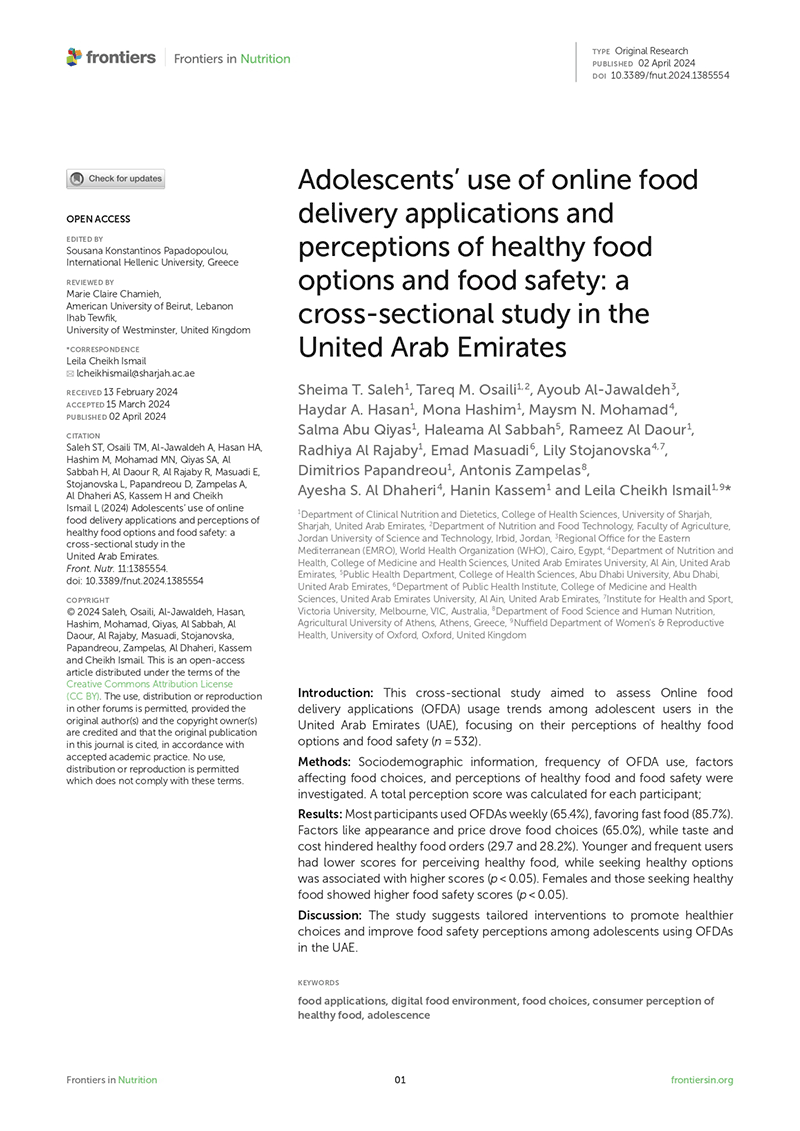
Adolescents’ use of online food delivery applications and perceptions of healthy food options and food safety: a cross-sectional study in the United Arab Emirates
Publication date: 2024
The study highlights the challenges in healthy food accessibility and the use of Online food delivery applications (OFDA) among young users. The findings highlight unfavorable food choices among adolescent users, with appearance and price as the main drivers for food choices. The study suggests tailored interventions to promote healthier choices and improve food safety perceptions among adolescents using OFDAs in the UAE
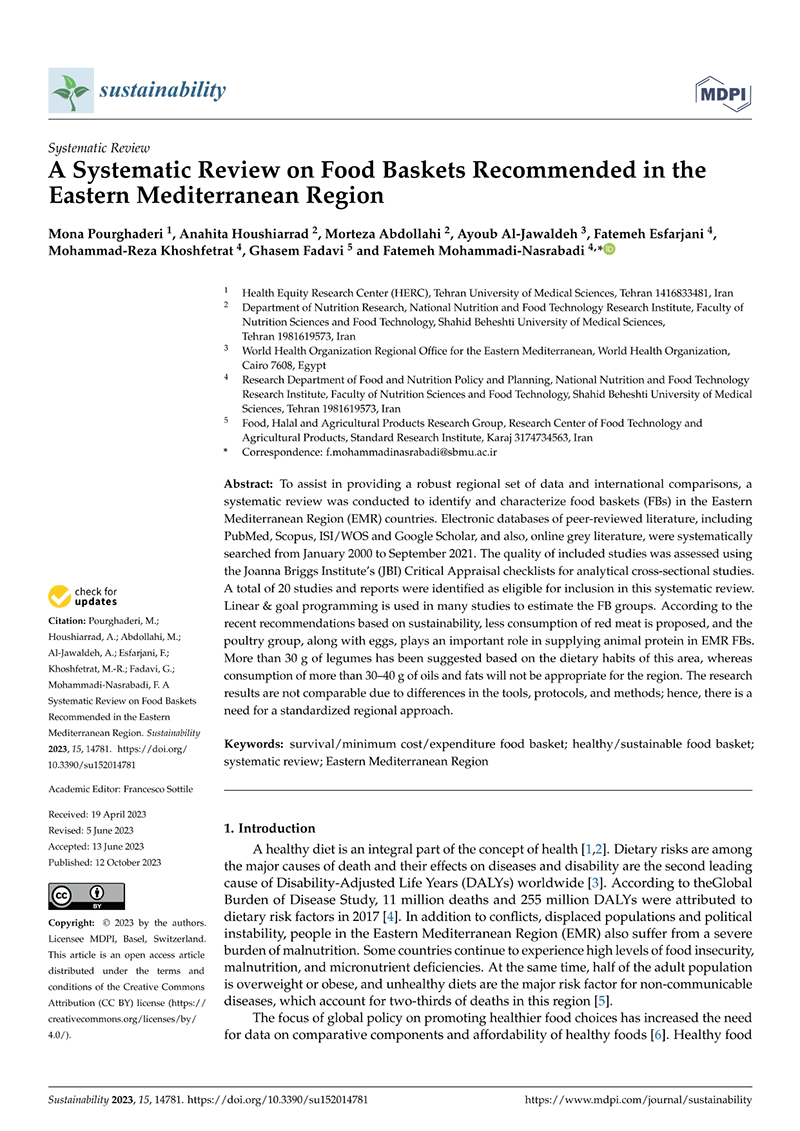
A Systematic Review on Food Baskets Recommended in the Eastern Mediterranean Region
Publication date: 2023
This systematic review examined food basket recommendations within the WHO's EMR. The review sought to identify and analyze existing evidence on recommended food baskets in the region, considering factors like nutritional adequacy, affordability, and cultural appropriateness. The review aims to provide insights for policymakers and practitioners working to improve nutrition and food security in the EMR, highlighting best practices and gaps in current food basket approaches. It likely emphasizes the importance of context-specific food baskets tailored to the unique needs and resources of different populations within the region.
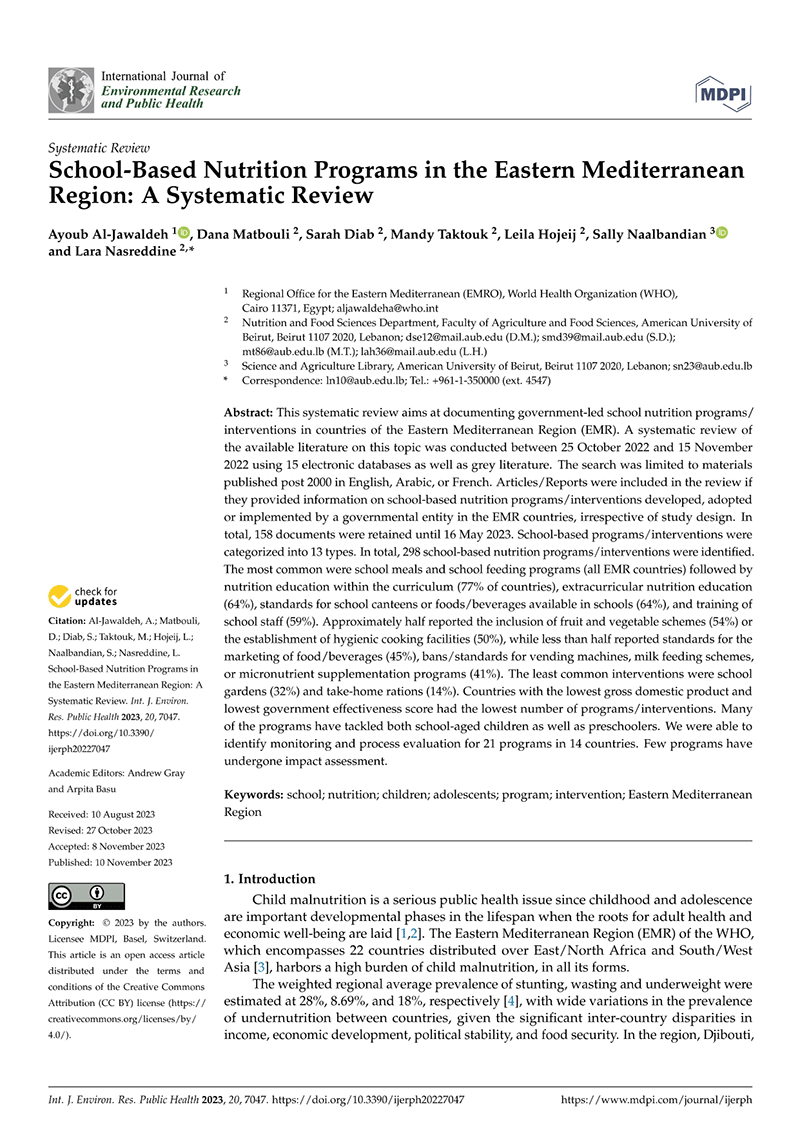
School-Based Nutrition Programs in the Eastern Mediterranean Region: A Systematic Review
Publication date: 2023
This systematic review aims at documenting government-led school nutrition programs/interventions in countries of the EMR. Countries with the lowest gross domestic product and lowest government effectiveness score had the lowest number of programs/interventions. Many of the programs have tackled both school-aged children as well as preschoolers. We were able to identify monitoring and process evaluation for 21 programs in 14 countries. Few programs have undergone impact assessment.
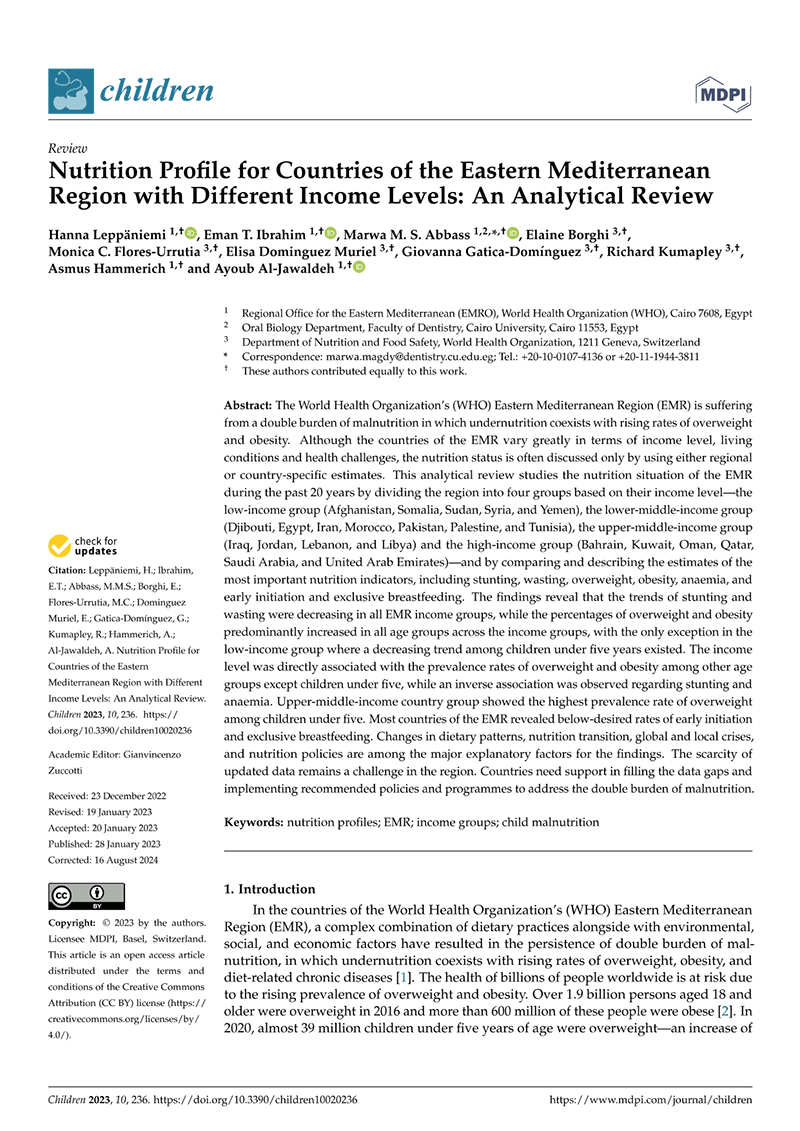
Nutrition profile for countries of the Eastern Mediterranean Region with different income levels: an analytical review
Publication date: 2023
A recent analytical review of the WHO's EMR reveals a persistent double burden of malnutrition, with undernutrition coexisting with increasing overweight and obesity rates. The review, which divides EMR countries into four income groups, examines trends in key nutrition indicators over the past 20 years, including stunting, wasting, overweight, obesity, anemia, and breastfeeding practices. Findings indicate a decrease in stunting and wasting across all income groups, but a rise in overweight and obesity in most age groups. The review emphasizes the need to address data scarcity and support countries in implementing effective policies and programs to combat the double burden of malnutrition in the EMR.

A Systematic Review on Food Baskets Recommended in the Eastern Mediterranean Region
Publication date: 2023
This systematic review examined food basket recommendations within the WHO's EMR. The review sought to identify and analyze existing evidence on recommended food baskets in the region, considering factors like nutritional adequacy, affordability, and cultural appropriateness. The review aims to provide insights for policymakers and practitioners working to improve nutrition and food security in the EMR, highlighting best practices and gaps in current food basket approaches. It likely emphasizes the importance of context-specific food baskets tailored to the unique needs and resources of different populations within the region.

School-Based Nutrition Programs in the Eastern Mediterranean Region: A Systematic Review
Publication date: 2023
This systematic review aims at documenting government-led school nutrition programs/interventions in countries of the EMR. Countries with the lowest gross domestic product and lowest government effectiveness score had the lowest number of programs/interventions. Many of the programs have tackled both school-aged children as well as preschoolers. We were able to identify monitoring and process evaluation for 21 programs in 14 countries. Few programs have undergone impact assessment.
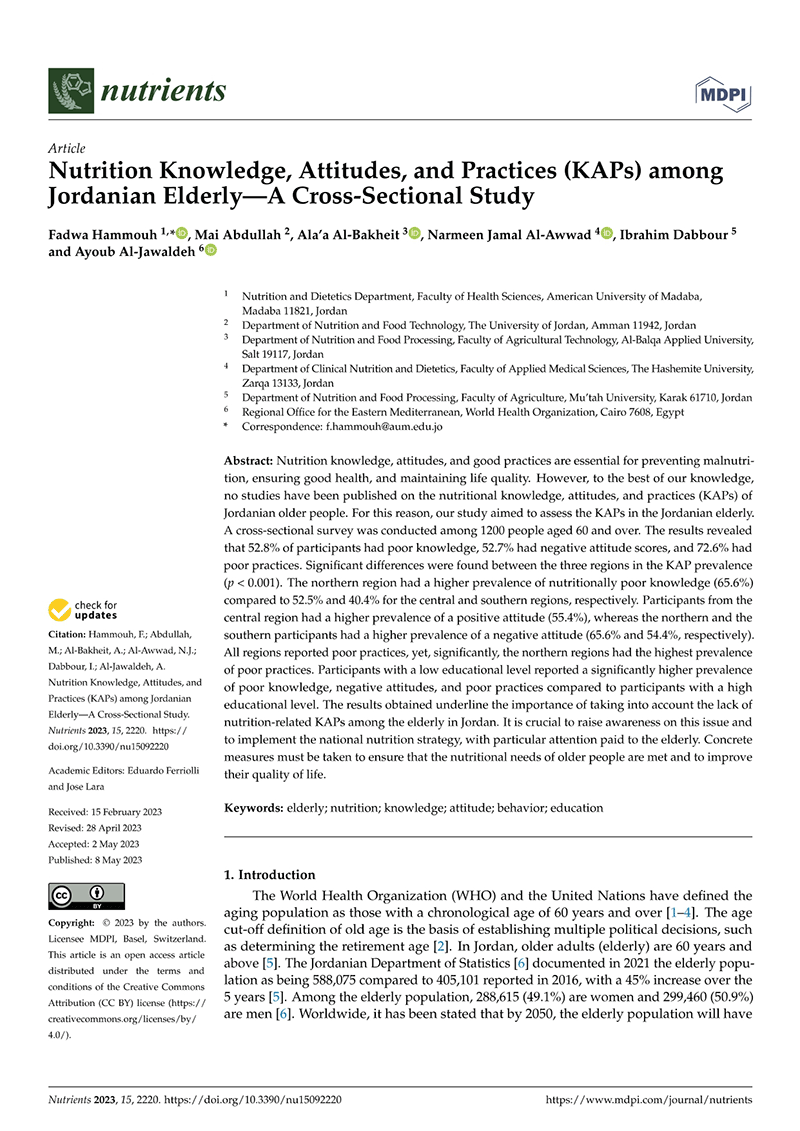
Nutrition Knowledge, Attitudes, and Practices (KAPs) among Jordanian elderly—a cross-sectional study
Publication date: 2023
This cross-sectional study assessed nutrition knowledge, attitudes, and practices (KAP) among 1200 Jordanian elderly individuals. The study found that over half of the participants had poor nutrition knowledge and negative attitudes towards healthy eating. Almost three-quarters demonstrated poor nutritional practices. The study highlights the need for targeted nutrition interventions to improve the health and well-being of older adults in Jordan, particularly focusing on those with lower education levels and in specific regions. It suggests that improving nutrition knowledge and promoting positive attitudes can lead to better dietary practices and overall health outcomes in this vulnerable population.
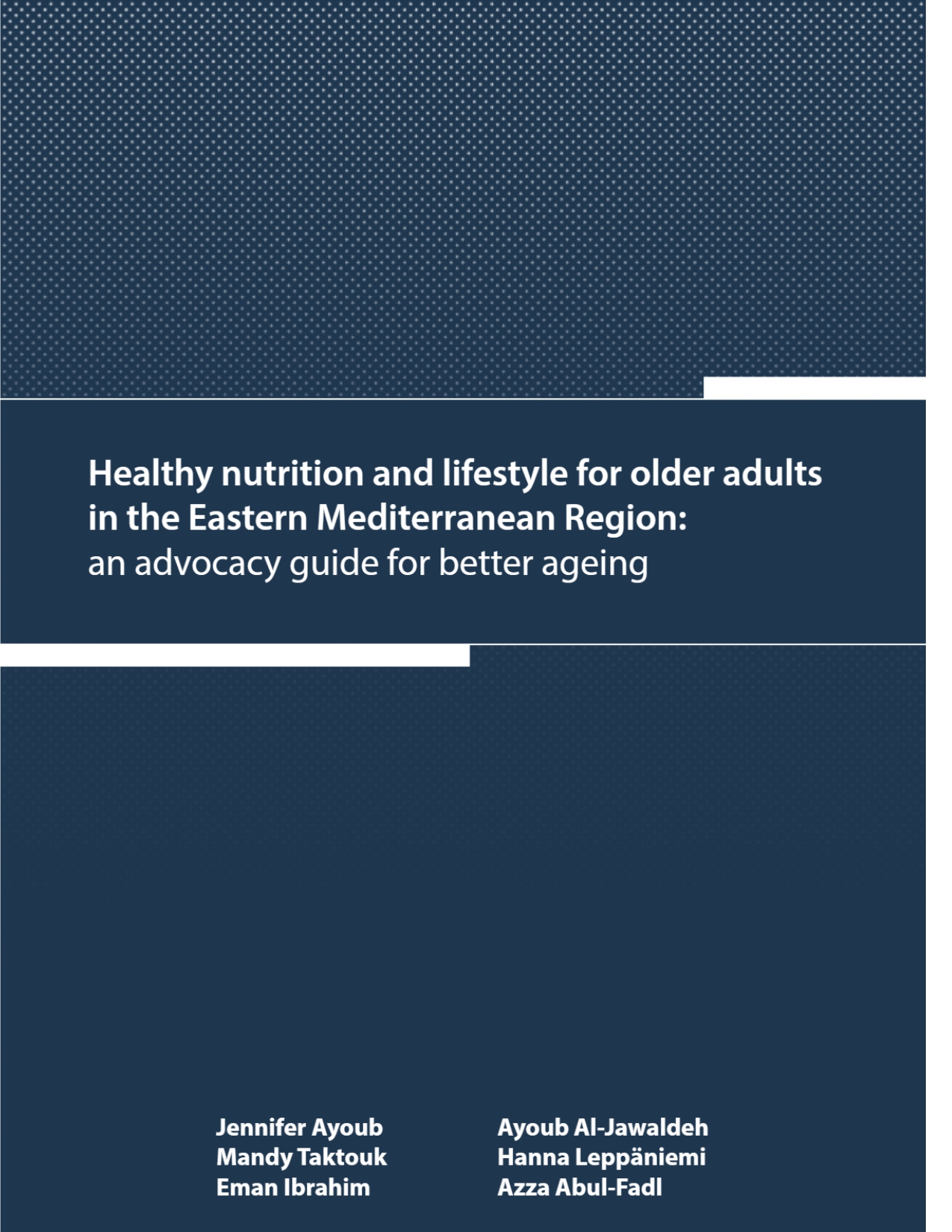
Healthy nutrition and lifestyle for older adults in the Eastern Mediterranean Region: an advocacy guide for better ageing
Publication date: 2022
Healthy diet and lifestyle help optimize the overall health and wellbeing of older adults. Prevention of malnutrition is an important element of the WHO’s integrated care for older people guidance. In the EMR, older adults have been an underrepresented target group in nutrition research and advocacy. Therefore, this advocacy guide aims to contribute to narrowing this research gap.
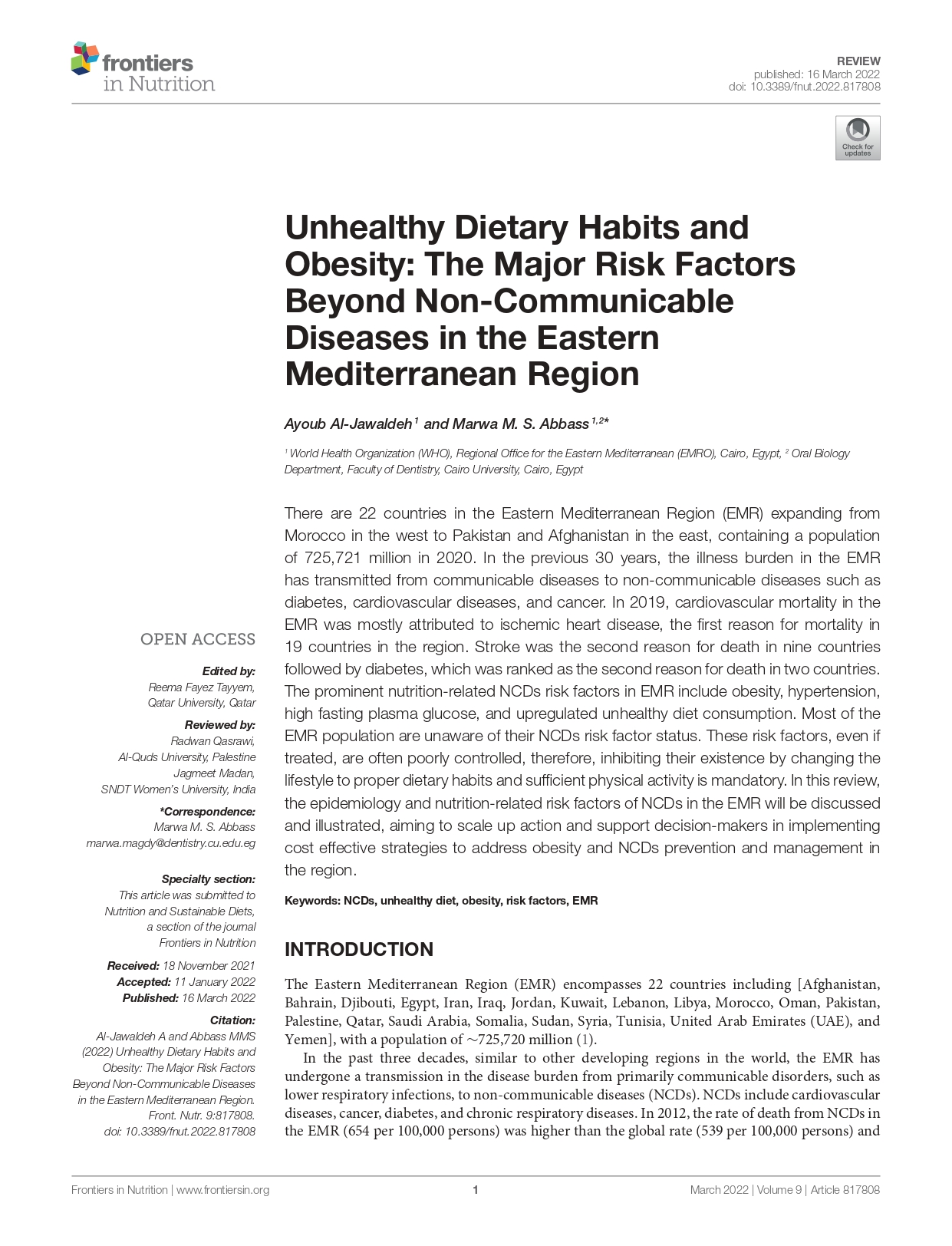
Unhealthy dietary habits and obesity: the major risk factors beyond non-communicable diseases in the Eastern Mediterranean Region
Publication date: 2022
Over the past 30 years, the illness burden in the Eastern Mediterranean Region (EMR) has been transmitted from communicable diseases to noncommunicable diseases (NCDs) such as diabetes, cardiovascular diseases, and cancer. This review discusses and illustrates the epidemiology and nutrition-related risk factors of NCDs in the EMR, aiming to scale up action and support decision-makers in implementing cost-effective strategies to address obesity and NCDs prevention and management in the Region.
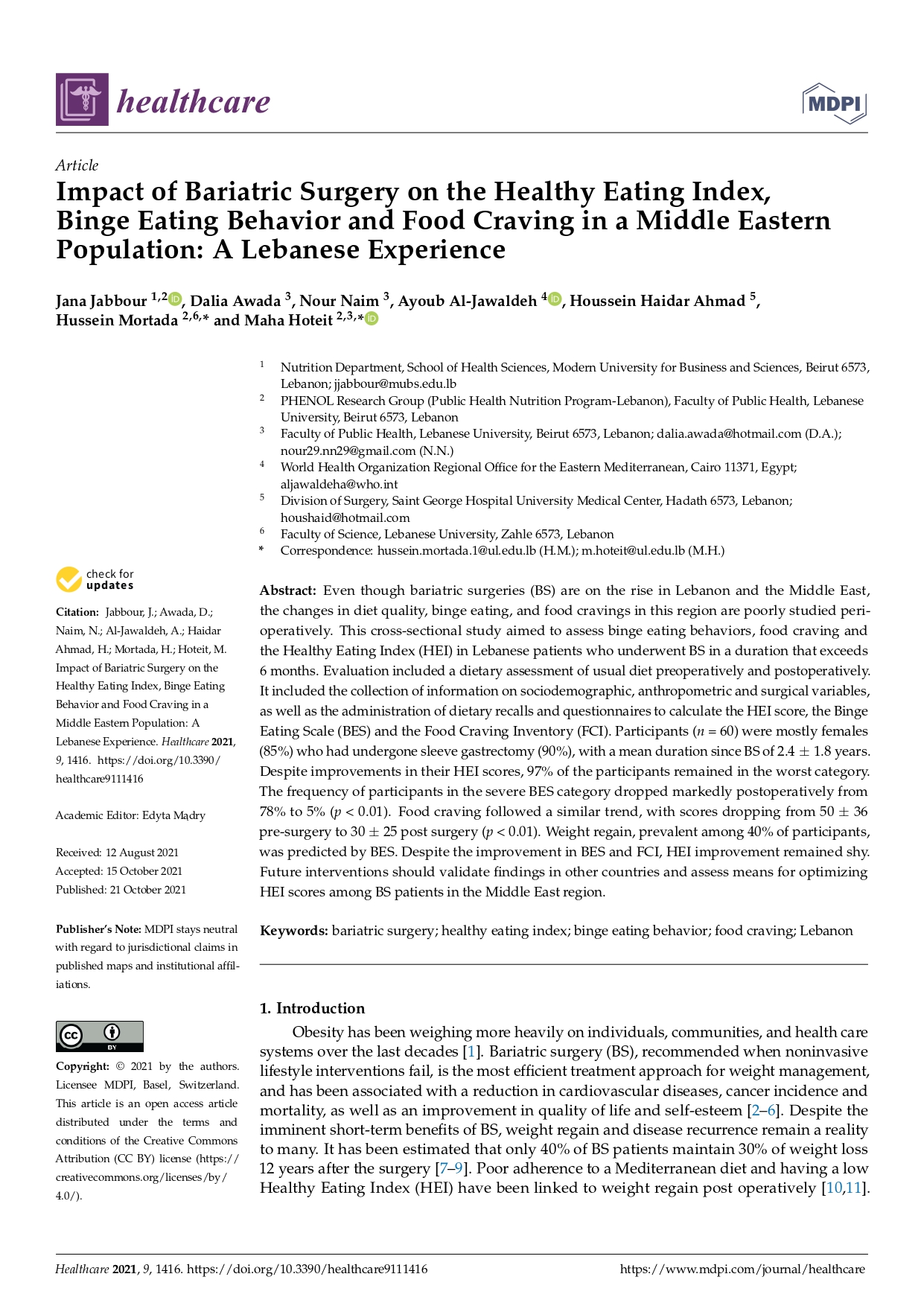
Impact of bariatric surgery on the healthy eating index, binge eating behavior and food craving in a Middle Eastern population: a Lebanese experience
Publication date: 2021
This cross-sectional study aimed to assess binge eating behaviors, food cravings and the healthy eating index in Lebanese patients who underwent bariatric surgeries in a duration that exceeds six months. The study concludes that despite the improvement in binge eating scale and food craving inventory, healthy eating index improvement remained shy. Future interventions should validate findings in other countries and assess means for optimizing healthy eating index scores among bariatric surgeries patients in the Middle East.

Fatty acids quality in Middle Eastern traditional dishes, Arabic sweets and market foods frequently consumed in Lebanon
Publication date: 2021
The prevalence of diet-related noncommunicable diseases is on the rise in countries of the Eastern Mediterranean Region, including Lebanon. This study provides data on fatty acid profiles and ratios of Lebanese composite dishes, Arabic sweets, and market foods. The findings show that there is a need to prioritize fat content in foods and consider processing modifications in the food production system with the aim of achieving a higher polyunsaturated to monounsaturated (P:M:S) ratio intake among the population.
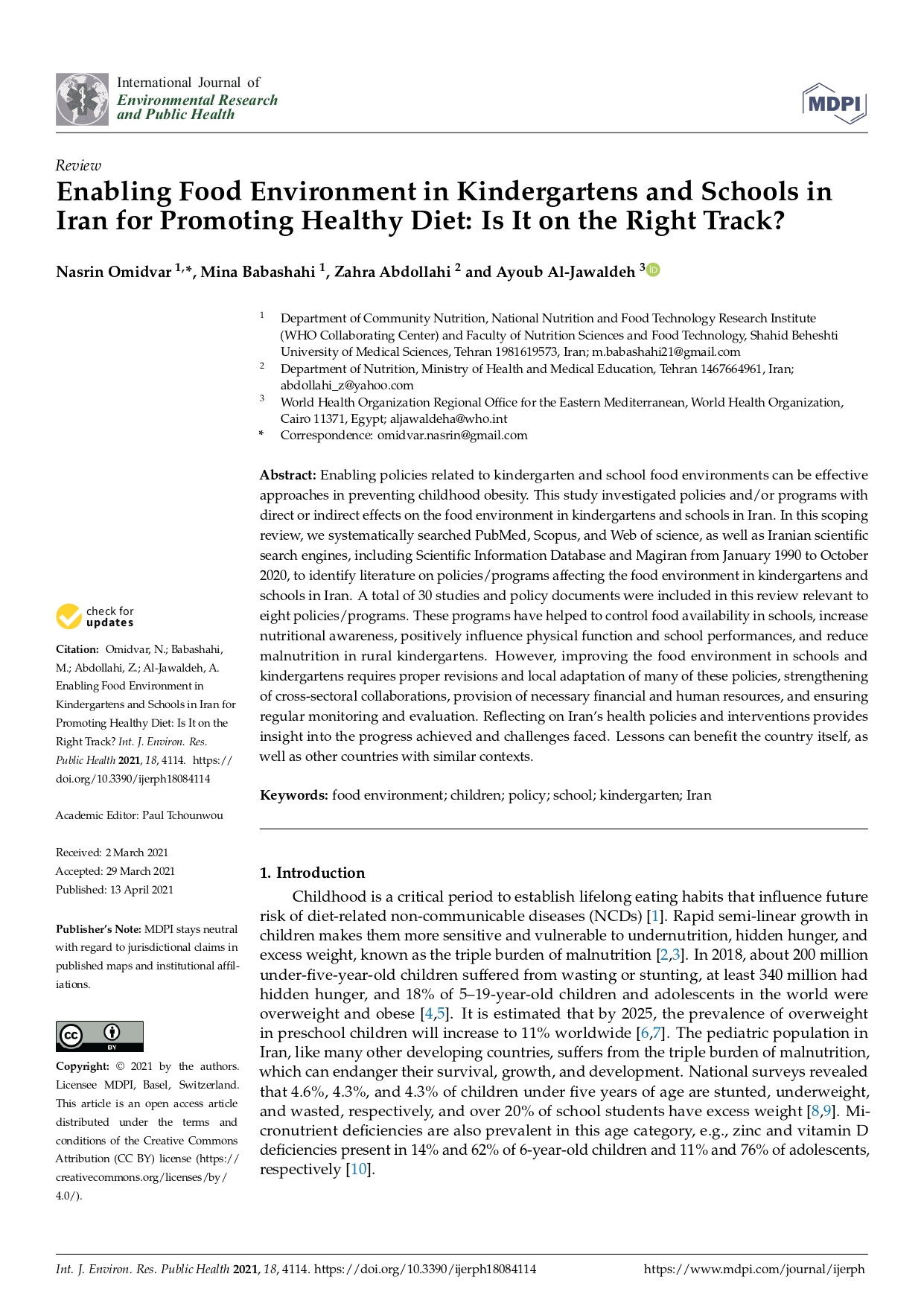
Enabling food environment in kindergartens and schools in Iran for promoting healthy diet: is it on the right track?
Publication date: 2021
Enabling policies related to kindergarten and school food environments can be effective approaches in preventing childhood obesity. This study investigated policies and/or programmes with direct or indirect effects on the food environment in kindergartens and schools in Iran. These programmes have helped to control food availability in schools, increase nutritional awareness, positively influence physical function and school performances, and reduce malnutrition in rural kindergartens. However, improving the food environment in schools and kindergartens requires proper revisions and local adaptation of many of these policies, strengthening of cross-sectoral collaborations, provision of necessary financial and human resources, and ensuring regular monitoring and evaluation.

Enhancing nutrition specific interventions through public health policies and public-private partnerships in the Eastern Mediterranean Region: a desk review
Publication date: 2021
Public private partnerships in public health have been widely promoted as an effective tool for accelerating progress towards achieving the United Nation’s Sustainable Development Goals, including Goal 2 “to eliminate hunger”. Partnership with the private sector was found to be instrumental in improving the nutritional status of poor and food-insecure people and promoting healthy lifestyles. The objective of this study is to assess the role and contribution of the private sector in the design/implementation of nutrition-specific interventions addressing the double burden of malnutrition in countries of the Region and identify the key factors for successful public private partnership implementation.

Development of a Lebanese food exchange system based on frequently consumed Eastern Mediterranean traditional dishes and Arabic sweets
Publication date: 2021
This study aims to convert the recipes of the Lebanese traditional dishes into meal planning exchange lists whose items are expressed in grams and adjusted to Lebanese household measures (cups and spoons) that could be used by healthcare professionals. This study provides healthcare professionals, dietitians and consumers the chance to proficiently plan traditional-type dishes, ensuring prominent dietetic and medical nutritional therapy practices and patient's self-control.

Enhancing nutrition specific interventions through public health policies and public-private partnerships in the Eastern Mediterranean Region: a desk review
Publication date: 2021
Public private partnerships in public health have been widely promoted as an effective tool for accelerating progress towards achieving the United Nation’s Sustainable Development Goals, including Goal 2 “to eliminate hunger”. Partnership with the private sector was found to be instrumental in improving the nutritional status of poor and food-insecure people and promoting healthy lifestyles. The objective of this study is to assess the role and contribution of the private sector in the design/implementation of nutrition-specific interventions addressing the double burden of malnutrition in countries of the Region and identify the key factors for successful public private partnership implementation.
Nutritional value of the Middle Eastern diet: analysis of total sugar, salt and iron in Lebanese traditional dishes
Publication date: 2020
The expanding burden of diet-related noncommunicable diseases in the Eastern Mediterranean requires urgent public health vigilance and actions. This study aims at establishing a database analysis of total sugar, salt and iron content in Lebanese foods, focusing on traditional dishes. It emphasizes the need for multi-cultural education and awareness on food sources of salt and iron, and the health effects regarding high intake of salt and low intake of iron.
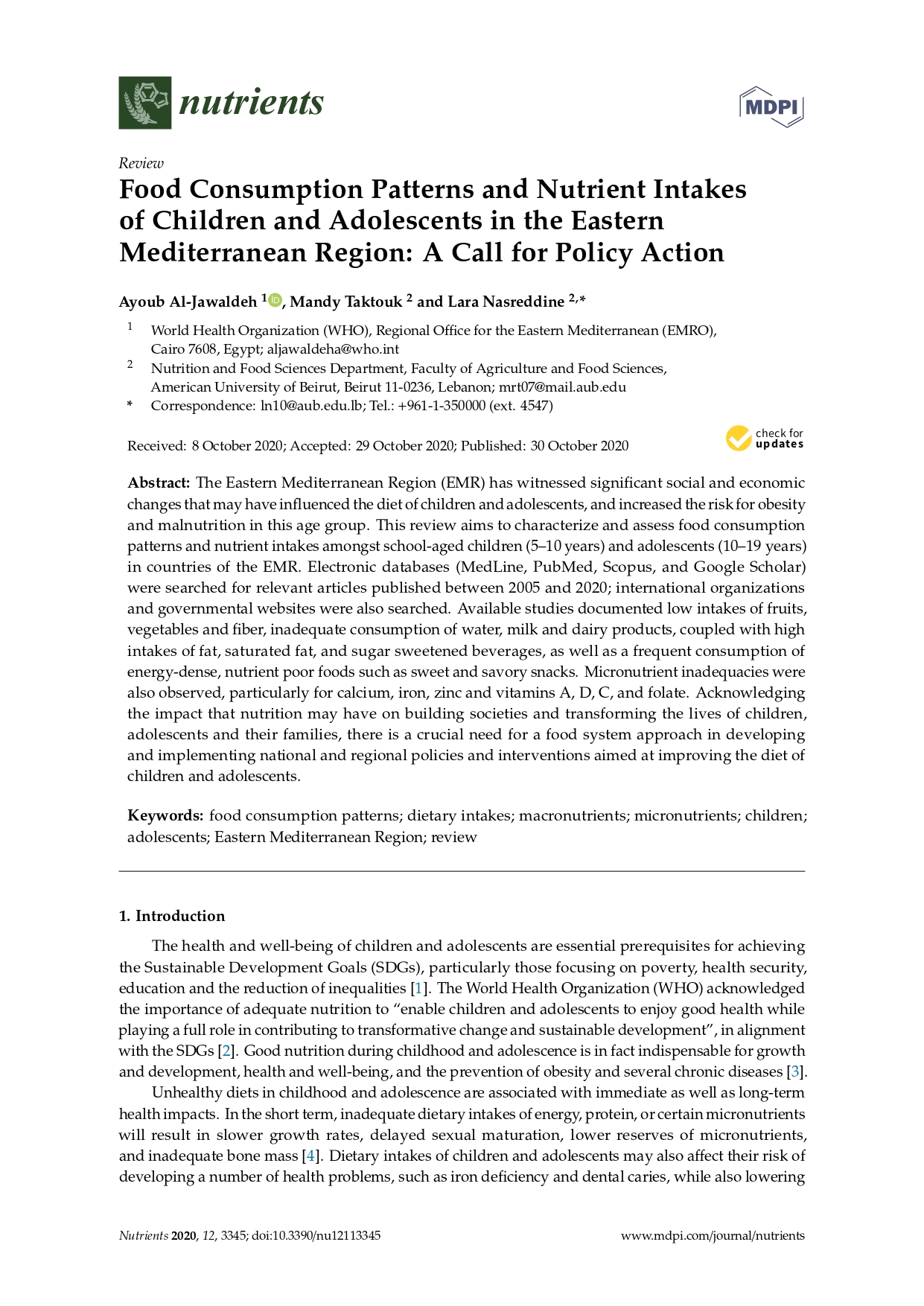
Food consumption patterns and nutrient intakes of children and adolescents in the Eastern Mediterranean Region: a call for policy action
Publication date: 2020
The Eastern Mediterranean Region has witnessed significant social and economic changes that may have influenced the diet of children and adolescents, and increased the risk for obesity and malnutrition in this age group. This review aims to characterize and assess food consumption patterns and nutrient intakes amongst school-aged children (5–10 years) and adolescents (10–19 years) in countries of the Region. Acknowledging the impact that nutrition may have on building societies and transforming the lives of children, adolescents and their families, there is a crucial need for a food system approach in developing and implementing national and regional policies and interventions aimed at improving the diet of children and adolescents.

Implementation of WHO recommended policies and interventions on healthy diet in the countries of the Eastern Mediterranean Region: from policy to action
Publication date: 2020
Noncommunicable diseases are responsible for almost two-thirds of deaths in the 22 countries and territories of the WHO Eastern Mediterranean Region and unhealthy diets are a major contributor. Prevalence of overweight and obesity has increased among adults, adolescents and older children in recent decades. This review summarizes prevalence data and examines current implementation of regulatory, fiscal and voluntary measures to promote healthy diet across the Region and highlights where further progress in implementation is still needed.
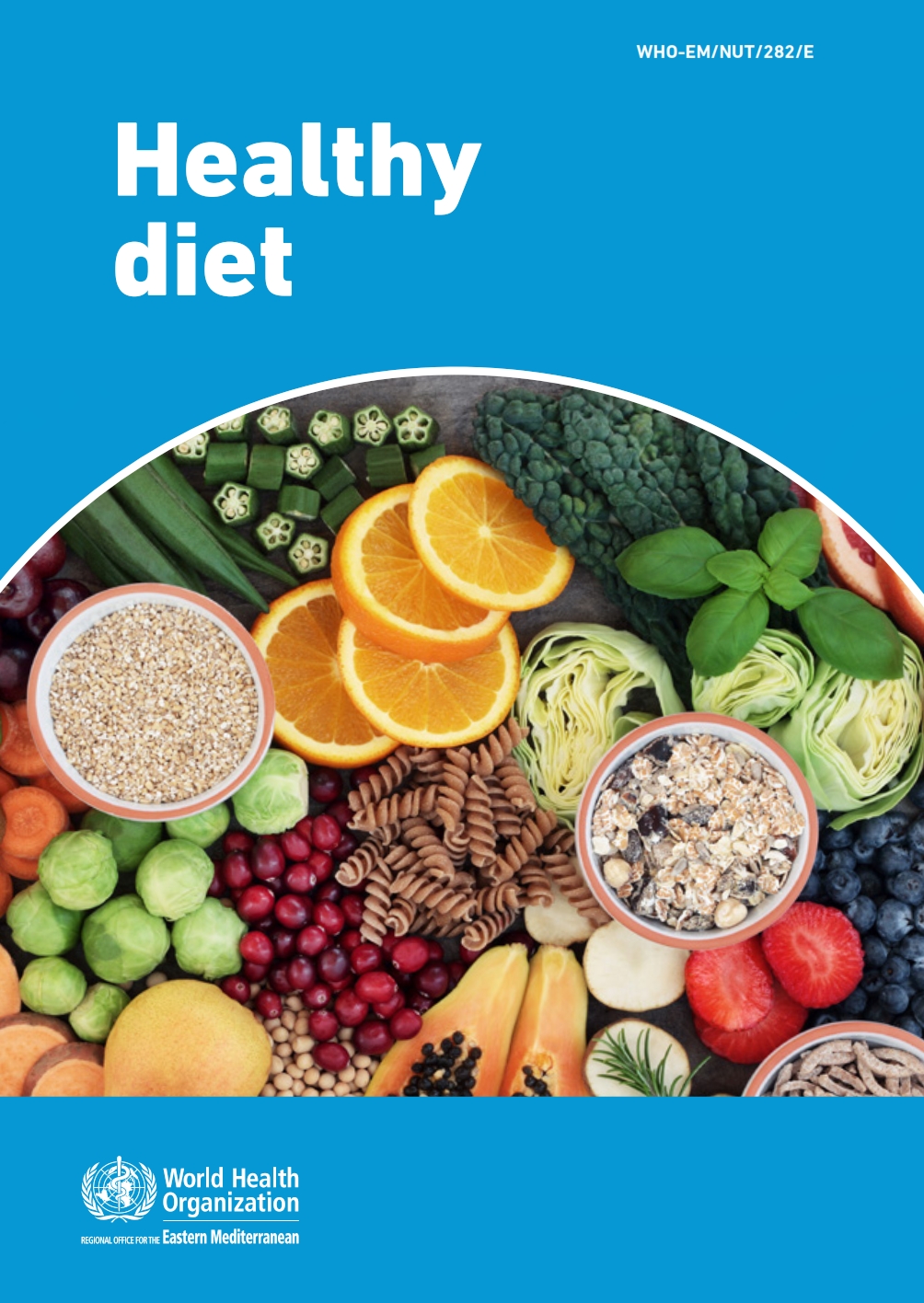
Healthy diet
Publication date: 2019
This document offers guidance on methods of maintaining a healthy diet for adults as well as infants and young children. It shows how adopting a healthy diet protects from malnutrition and the risks of noncommunicable diseases. There is also a dedicated section addressing policy-makers on effective actions for creating a healthy food environment for people and a final section listing the different mechanisms provided by WHO since 2004 to support countries in implementing their nutrition-related action plans.
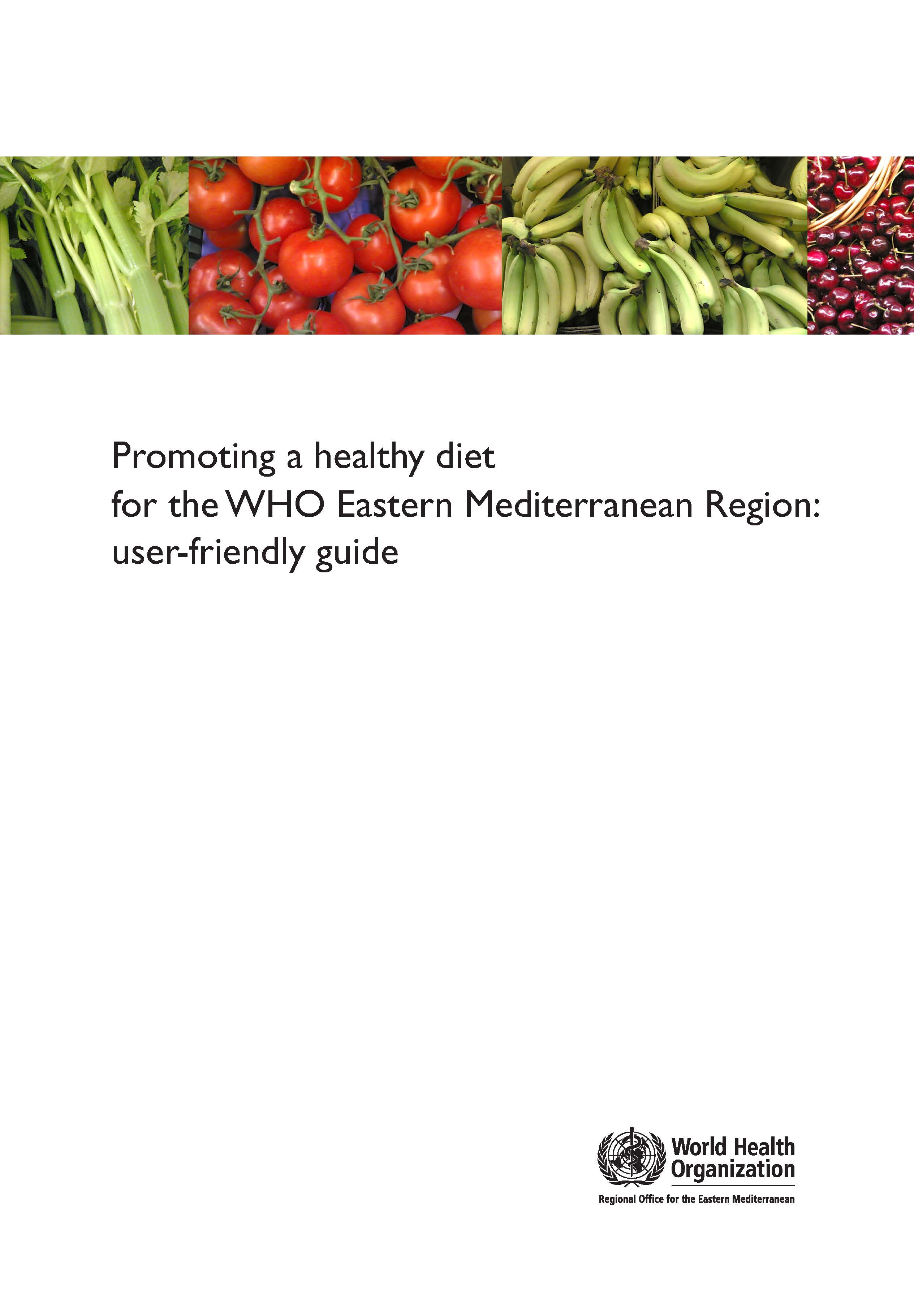
Promoting a healthy diet for the WHO Eastern Mediterranean Region: user-friendly guide
Publication date: 2012
This user-friendly guide provides dietary advice to promote health and reduce the risk of major chronic diseases through diet and physical activity. It presents a set of dietary recommendations that are compatible with the different cultures and eating patterns of consumers in the Region. It represents an essential tool in supporting national and regional strategies to improve nutrition outcomes and health in the Region. It is primarily intended for use by policy-makers, health care providers, nutritionists, nutrition educators and anyone involved in food distribution and food service. It can also be used by schools, homes, cafeterias and businesses to improve the food choices for a range of consumers.




